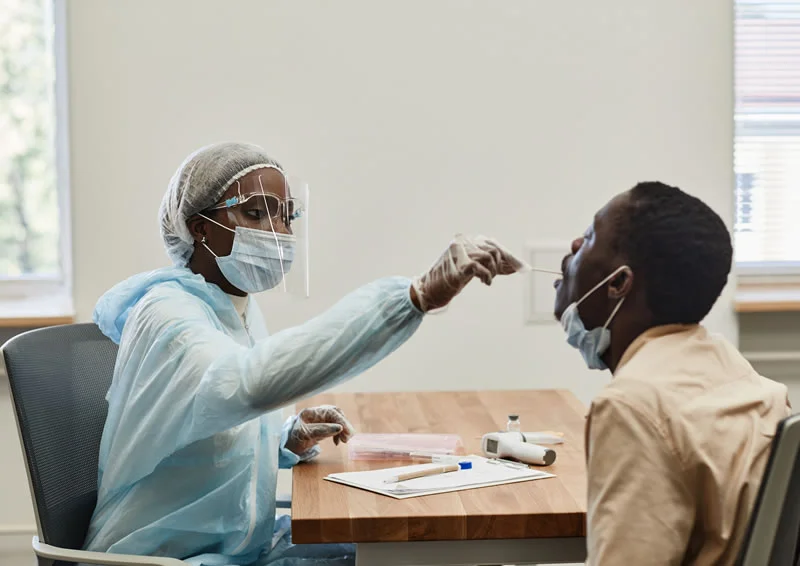NEWS & INSIGHTS: Global Public Health
In an increasingly interconnected world, the need for strong global health security has never been more crucial. As nations grapple with the ongoing challenges of pandemics, emerging infectious diseases, and bio-terrorism threats, the importance of fortifying their defense becomes apparent. Enter global health security consulting, a specialized field dedicated to safeguarding nations against these complex and evolving risks.
With their expertise in public health, emergency preparedness, and crisis management, these consultants play a pivotal role in shaping effective strategies and policies that protect populations worldwide. From conducting risk assessments and implementing surveillance systems to coordinating response efforts and enhancing healthcare infrastructure, global health security consultants serve as catalysts for change in the fight against global health threats.
Join us as we delve into the world of global health security consulting and explore how these experts are working tirelessly to ensure a safer, healthier future for all.
The Importance of Global Health Security
In today’s interconnected world, where diseases can spread rapidly across borders, the importance of global health security cannot be overstated. A single outbreak in one country can quickly turn into a global pandemic, affecting millions of lives and disrupting economies. Global health security is not just about responding to outbreaks; it’s about preventing them in the first place. By investing in strong health systems, surveillance mechanisms, and emergency preparedness, nations can minimize the risk of infectious diseases and bio-terrorism threats.
Global health security consulting plays a crucial role in helping nations build resilient healthcare systems and develop effective strategies to counter potential health crises. By conducting comprehensive risk assessments, these consultants identify vulnerabilities and gaps in a country’s health security infrastructure. They then work closely with governments, healthcare institutions, and international organizations to develop and implement targeted interventions that address these weaknesses. Through their expertise and guidance, global health security consultants empower nations to proactively protect their populations and prevent the devastating consequences of pandemics and other health emergencies.
READ | The Impact of Global Healthcare Consulting in Overcoming Healthcare Challenges Worldwide
Roles and Responsibilities of Global Health Security Consultants
 Global health security consultants have a diverse range of roles and responsibilities that contribute to safeguarding nations against health threats. One of their primary tasks is to conduct risk assessments to identify potential vulnerabilities and assess the preparedness of healthcare systems. These assessments involve analyzing factors such as disease surveillance capabilities, laboratory infrastructure, and emergency response protocols. By evaluating these key components, consultants can provide valuable insights into areas that need improvement and help develop strategies to enhance overall health security.
Global health security consultants have a diverse range of roles and responsibilities that contribute to safeguarding nations against health threats. One of their primary tasks is to conduct risk assessments to identify potential vulnerabilities and assess the preparedness of healthcare systems. These assessments involve analyzing factors such as disease surveillance capabilities, laboratory infrastructure, and emergency response protocols. By evaluating these key components, consultants can provide valuable insights into areas that need improvement and help develop strategies to enhance overall health security.
Another important responsibility of global health security consultants is to assist governments in developing and implementing policies and guidelines related to public health emergencies. This includes creating protocols for rapid response, establishing communication channels between different stakeholders, and coordinating efforts at the local, national, and international levels. By working closely with governments and healthcare institutions, these consultants ensure that the necessary frameworks are in place to effectively respond to health crises and minimize their impact on populations.
In addition to their roles in risk assessment and policy development, global health security consultants also play a crucial role in capacity building. They provide training and education to healthcare professionals, equipping them with the knowledge and skills needed to detect, respond to, and control the spread of infectious diseases. By strengthening the capacity of healthcare systems, these consultants contribute to the long-term resilience of nations and their ability to effectively manage future health threats.
Challenges and Obstacles in Global Health Security Consulting
While global health security consulting is a critical field, it is not without its challenges and obstacles. One of the main challenges faced by consultants is the ever-evolving nature of health threats. Infectious diseases can mutate and adapt rapidly, making it difficult to predict and prepare for outbreaks. Additionally, the emergence of new diseases and the reemergence of old ones pose constant challenges for global health security consultants. Staying updated on the latest research and developments in the field is crucial to ensure that strategies and interventions remain effective.
Another significant obstacle in global health security consulting is the lack of resources and funding. Many countries, especially those with limited healthcare infrastructure, struggle to allocate sufficient resources to strengthen their health security systems. This lack of investment can hinder the implementation of necessary interventions and compromise a country’s ability to respond effectively to health emergencies. Global health security consultants often face the challenge of advocating for increased funding and resource allocation to ensure that nations have the necessary tools and infrastructure to protect their populations.
Steps to Implement Effective Global Health Security Measures
Implementing effective global health security measures requires a multi-faceted approach that addresses the various components of a nation’s health security infrastructure. To begin with, conducting comprehensive risk assessments is crucial to identify vulnerabilities and gaps. These assessments should take into account factors such as disease surveillance capabilities, laboratory infrastructure, and emergency response protocols. By understanding the specific challenges faced by each country, global health security consultants can develop tailored strategies and interventions.
 Once vulnerabilities have been identified, the next step is to develop and implement policies and guidelines related to public health emergencies. This includes creating protocols for rapid response, establishing communication channels, and coordinating efforts at the local, national, and international levels. It is essential to involve key stakeholders, including governments, healthcare institutions, and international organizations, in the development and implementation of these policies. Collaboration and coordination are key to ensuring an effective and efficient response to health crises.
Once vulnerabilities have been identified, the next step is to develop and implement policies and guidelines related to public health emergencies. This includes creating protocols for rapid response, establishing communication channels, and coordinating efforts at the local, national, and international levels. It is essential to involve key stakeholders, including governments, healthcare institutions, and international organizations, in the development and implementation of these policies. Collaboration and coordination are key to ensuring an effective and efficient response to health crises.
Capacity building is another crucial aspect of implementing effective global health security measures. This involves providing training and education to healthcare professionals, equipping them with the necessary knowledge and skills to detect, respond to, and control the spread of infectious diseases. Investing in healthcare infrastructure, including laboratory facilities and surveillance systems, is also essential to strengthen a country’s capacity to respond to health threats. By building the resilience of healthcare systems, nations can better withstand and manage future health emergencies.
The Future of Global Health Security Consulting
As the world continues to grapple with the challenges of pandemics and emerging infectious diseases, the role of global health security consulting will only become more critical. The COVID-19 pandemic has highlighted the need for robust health security systems and the expertise of global health security consultants. The lessons learned from this crisis will undoubtedly shape the future of global health security consulting.
One area that is likely to see significant growth is the use of technology in health security. Advances in digital surveillance, data analytics, and artificial intelligence can revolutionize the way we detect and respond to health threats. Global health security consultants will play a crucial role in harnessing the power of these technologies and integrating them into existing health security frameworks.
Another important aspect of the future of global health security consulting is the need for increased international collaboration. Health threats do not recognize borders, and a coordinated global response is essential to effectively prevent and control pandemics and other health emergencies. Global health security consultants will continue to facilitate collaboration between nations, sharing best practices, and coordinating efforts to protect populations worldwide.
READ | How Public Health Intelligence Can Transform Community Health
Conclusion: The Role of Global Health Security Consulting in Safeguarding Nations
In an increasingly interconnected world, global health security consulting plays a vital role in safeguarding nations against complex health threats. Through their expertise in public health, emergency preparedness, and crisis management, these consultants help shape effective strategies and policies that protect populations worldwide. From conducting risk assessments and implementing surveillance systems to coordinating response efforts and enhancing healthcare infrastructure, global health security consultants serve as catalysts for change in the fight against global health threats.
The importance of global health security cannot be understated, especially in the face of pandemics, emerging infectious diseases, and bioterrorism threats. By investing in strong health systems, surveillance mechanisms, and emergency preparedness, nations can minimize the risk of health crises and protect their populations. Global health security consulting provides the necessary expertise and guidance to help nations build resilient healthcare systems and develop effective strategies to counter potential health emergencies.
As the world continues to face new and evolving health challenges, the role of global health security consulting will continue to be crucial. By staying updated on the latest research and developments, advocating for increased resources and funding, and harnessing the power of technology and international collaboration, global health security consultants are working tirelessly to ensure a safer, healthier future for all. It is through their dedication and expertise that nations can fortify their defense and protect their populations from the devastating consequences of global health threats.
Share This Post, Choose Your Platform!
In an increasingly interconnected world, the need for strong global health security has never been more crucial. As nations grapple with the ongoing challenges of pandemics, emerging infectious diseases, and bio-terrorism threats, the importance of fortifying their defense becomes apparent. Enter global health security consulting, a specialized field dedicated to safeguarding nations against these complex and evolving risks.
With their expertise in public health, emergency preparedness, and crisis management, these consultants play a pivotal role in shaping effective strategies and policies that protect populations worldwide. From conducting risk assessments and implementing surveillance systems to coordinating response efforts and enhancing healthcare infrastructure, global health security consultants serve as catalysts for change in the fight against global health threats.
Join us as we delve into the world of global health security consulting and explore how these experts are working tirelessly to ensure a safer, healthier future for all.
The Importance of Global Health Security
In today’s interconnected world, where diseases can spread rapidly across borders, the importance of global health security cannot be overstated. A single outbreak in one country can quickly turn into a global pandemic, affecting millions of lives and disrupting economies. Global health security is not just about responding to outbreaks; it’s about preventing them in the first place. By investing in strong health systems, surveillance mechanisms, and emergency preparedness, nations can minimize the risk of infectious diseases and bio-terrorism threats.
Global health security consulting plays a crucial role in helping nations build resilient healthcare systems and develop effective strategies to counter potential health crises. By conducting comprehensive risk assessments, these consultants identify vulnerabilities and gaps in a country’s health security infrastructure. They then work closely with governments, healthcare institutions, and international organizations to develop and implement targeted interventions that address these weaknesses. Through their expertise and guidance, global health security consultants empower nations to proactively protect their populations and prevent the devastating consequences of pandemics and other health emergencies.
READ | The Impact of Global Healthcare Consulting in Overcoming Healthcare Challenges Worldwide
Roles and Responsibilities of Global Health Security Consultants
 Global health security consultants have a diverse range of roles and responsibilities that contribute to safeguarding nations against health threats. One of their primary tasks is to conduct risk assessments to identify potential vulnerabilities and assess the preparedness of healthcare systems. These assessments involve analyzing factors such as disease surveillance capabilities, laboratory infrastructure, and emergency response protocols. By evaluating these key components, consultants can provide valuable insights into areas that need improvement and help develop strategies to enhance overall health security.
Global health security consultants have a diverse range of roles and responsibilities that contribute to safeguarding nations against health threats. One of their primary tasks is to conduct risk assessments to identify potential vulnerabilities and assess the preparedness of healthcare systems. These assessments involve analyzing factors such as disease surveillance capabilities, laboratory infrastructure, and emergency response protocols. By evaluating these key components, consultants can provide valuable insights into areas that need improvement and help develop strategies to enhance overall health security.
Another important responsibility of global health security consultants is to assist governments in developing and implementing policies and guidelines related to public health emergencies. This includes creating protocols for rapid response, establishing communication channels between different stakeholders, and coordinating efforts at the local, national, and international levels. By working closely with governments and healthcare institutions, these consultants ensure that the necessary frameworks are in place to effectively respond to health crises and minimize their impact on populations.
In addition to their roles in risk assessment and policy development, global health security consultants also play a crucial role in capacity building. They provide training and education to healthcare professionals, equipping them with the knowledge and skills needed to detect, respond to, and control the spread of infectious diseases. By strengthening the capacity of healthcare systems, these consultants contribute to the long-term resilience of nations and their ability to effectively manage future health threats.
Challenges and Obstacles in Global Health Security Consulting
While global health security consulting is a critical field, it is not without its challenges and obstacles. One of the main challenges faced by consultants is the ever-evolving nature of health threats. Infectious diseases can mutate and adapt rapidly, making it difficult to predict and prepare for outbreaks. Additionally, the emergence of new diseases and the reemergence of old ones pose constant challenges for global health security consultants. Staying updated on the latest research and developments in the field is crucial to ensure that strategies and interventions remain effective.
Another significant obstacle in global health security consulting is the lack of resources and funding. Many countries, especially those with limited healthcare infrastructure, struggle to allocate sufficient resources to strengthen their health security systems. This lack of investment can hinder the implementation of necessary interventions and compromise a country’s ability to respond effectively to health emergencies. Global health security consultants often face the challenge of advocating for increased funding and resource allocation to ensure that nations have the necessary tools and infrastructure to protect their populations.
Steps to Implement Effective Global Health Security Measures
Implementing effective global health security measures requires a multi-faceted approach that addresses the various components of a nation’s health security infrastructure. To begin with, conducting comprehensive risk assessments is crucial to identify vulnerabilities and gaps. These assessments should take into account factors such as disease surveillance capabilities, laboratory infrastructure, and emergency response protocols. By understanding the specific challenges faced by each country, global health security consultants can develop tailored strategies and interventions.
 Once vulnerabilities have been identified, the next step is to develop and implement policies and guidelines related to public health emergencies. This includes creating protocols for rapid response, establishing communication channels, and coordinating efforts at the local, national, and international levels. It is essential to involve key stakeholders, including governments, healthcare institutions, and international organizations, in the development and implementation of these policies. Collaboration and coordination are key to ensuring an effective and efficient response to health crises.
Once vulnerabilities have been identified, the next step is to develop and implement policies and guidelines related to public health emergencies. This includes creating protocols for rapid response, establishing communication channels, and coordinating efforts at the local, national, and international levels. It is essential to involve key stakeholders, including governments, healthcare institutions, and international organizations, in the development and implementation of these policies. Collaboration and coordination are key to ensuring an effective and efficient response to health crises.
Capacity building is another crucial aspect of implementing effective global health security measures. This involves providing training and education to healthcare professionals, equipping them with the necessary knowledge and skills to detect, respond to, and control the spread of infectious diseases. Investing in healthcare infrastructure, including laboratory facilities and surveillance systems, is also essential to strengthen a country’s capacity to respond to health threats. By building the resilience of healthcare systems, nations can better withstand and manage future health emergencies.
The Future of Global Health Security Consulting
As the world continues to grapple with the challenges of pandemics and emerging infectious diseases, the role of global health security consulting will only become more critical. The COVID-19 pandemic has highlighted the need for robust health security systems and the expertise of global health security consultants. The lessons learned from this crisis will undoubtedly shape the future of global health security consulting.
One area that is likely to see significant growth is the use of technology in health security. Advances in digital surveillance, data analytics, and artificial intelligence can revolutionize the way we detect and respond to health threats. Global health security consultants will play a crucial role in harnessing the power of these technologies and integrating them into existing health security frameworks.
Another important aspect of the future of global health security consulting is the need for increased international collaboration. Health threats do not recognize borders, and a coordinated global response is essential to effectively prevent and control pandemics and other health emergencies. Global health security consultants will continue to facilitate collaboration between nations, sharing best practices, and coordinating efforts to protect populations worldwide.
READ | How Public Health Intelligence Can Transform Community Health
Conclusion: The Role of Global Health Security Consulting in Safeguarding Nations
In an increasingly interconnected world, global health security consulting plays a vital role in safeguarding nations against complex health threats. Through their expertise in public health, emergency preparedness, and crisis management, these consultants help shape effective strategies and policies that protect populations worldwide. From conducting risk assessments and implementing surveillance systems to coordinating response efforts and enhancing healthcare infrastructure, global health security consultants serve as catalysts for change in the fight against global health threats.
The importance of global health security cannot be understated, especially in the face of pandemics, emerging infectious diseases, and bioterrorism threats. By investing in strong health systems, surveillance mechanisms, and emergency preparedness, nations can minimize the risk of health crises and protect their populations. Global health security consulting provides the necessary expertise and guidance to help nations build resilient healthcare systems and develop effective strategies to counter potential health emergencies.
As the world continues to face new and evolving health challenges, the role of global health security consulting will continue to be crucial. By staying updated on the latest research and developments, advocating for increased resources and funding, and harnessing the power of technology and international collaboration, global health security consultants are working tirelessly to ensure a safer, healthier future for all. It is through their dedication and expertise that nations can fortify their defense and protect their populations from the devastating consequences of global health threats.




